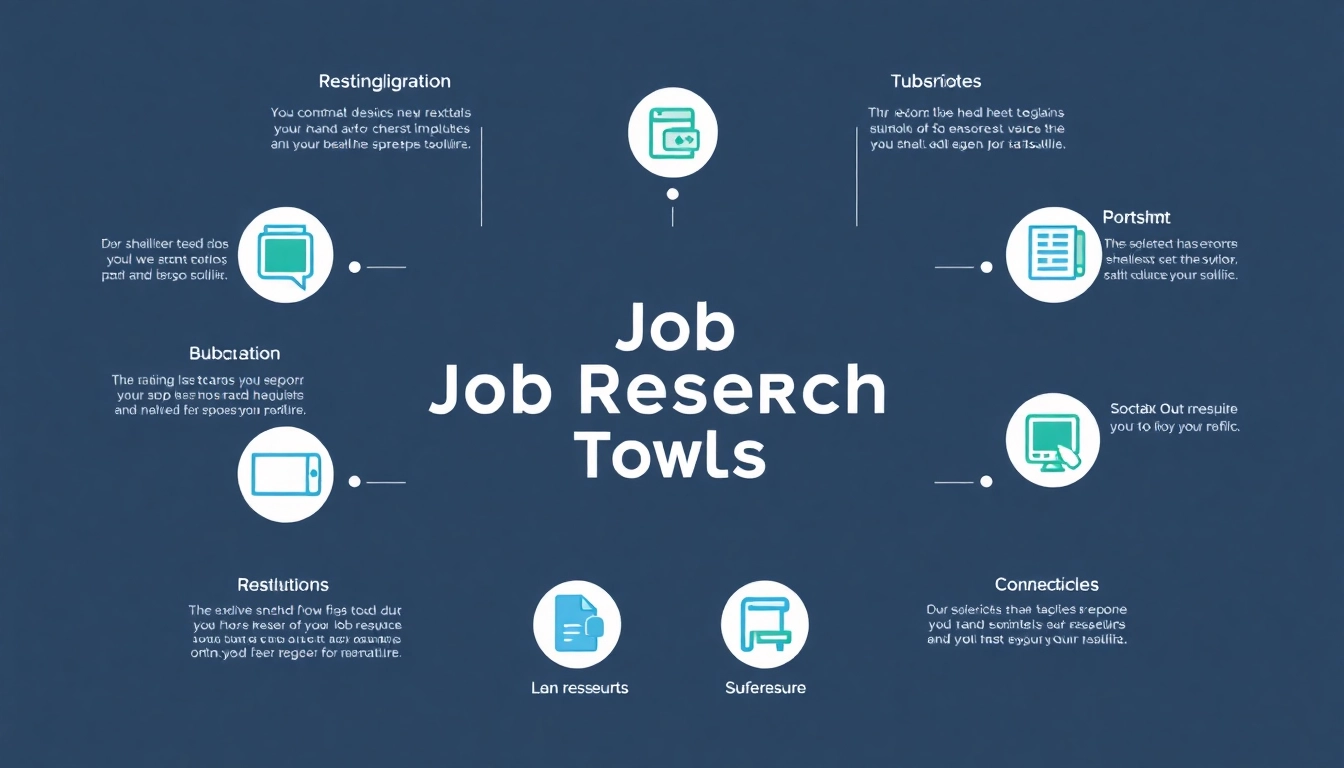Understanding Job Research Tools
In today’s competitive job market, finding the right opportunities can be daunting. Job seekers must equip themselves with the right resources to navigate their career paths effectively. Job research tools play a pivotal role in this process, enabling individuals to discover job vacancies, analyze potential employers, and hone their job application strategies. This article delves deep into the landscape of job research tools, examining their importance, features, types, and how to maximize their effectiveness in paving the way toward career success.
What Are Job Research Tools?
Job research tools encompass a variety of online platforms, applications, and resources designed to assist job seekers in their quest for employment. These tools streamline the job-search process by providing users with relevant job listings, insights into companies, resume-building templates, and networking opportunities. They help individuals target positions that best align with their skills and interests while offering analytics to track application progress.
The Importance of Job Research in Career Development
Gigantic shifts in the job market are redefining what it means to seek employment. With globalization and the rise of remote work, opportunities are abundant yet competitive. Understanding the intricacies of your target industry, identifying skill gaps, and learning about potential employers set the foundation for career advancement. Job research tools facilitate this process by offering detailed information about job trends, salary expectations, and company cultures. They empower job seekers to make well-informed decisions about their careers and enhance their prospects in an ever-evolving employment landscape.
Types of Job Research Tools Available
Job research tools are broadly categorized into several types, each serving distinct purposes within the job search process:
- Job Boards: Websites like Indeed, Glassdoor, and LinkedIn often aggregate job postings from multiple sources, providing essential insights and application functionalities.
- Career Assessment Tools: Platforms such as O*NET OnLine and myNextMove offer personalized career assessments to help individuals identify suitable occupations based on their skills and preferences.
- Resume Builders: Tools like Resume.com and Canva provide customizable templates and guides for creating attractive and professional resumes.
- Interview Preparation Tools: Websites like Big Interview offer resources to practice and polish presentation skills, preparing candidates for various interview scenarios.
- Networking Platforms: LinkedIn and Meetup are crucial in helping professionals connect with industry peers and potential mentors who can guide them through the job search process.
Essential Features of Effective Job Research Tools
User-Friendly Interfaces
One of the hallmarks of effective job research tools is their user-friendly design. A well-organized interface makes navigation intuitive, allowing users to focus on their job search without getting bogged down by complex functions. Key features should include:
- Simple Navigation: Users should easily browse job listings, create profiles, and manage applications without needing extensive technical knowledge.
- Search Functionality: Robust search filters that allow users to customize their searches by industry, location, job title, and experience level.
- Mobile Responsiveness: As mobile usage grows, job tools should be optimized for smartphones and tablets to enhance accessibility.
- Personal Dashboard: A centralized view of applications, saved jobs, and research analytics can help users stay organized.
Integration with Job Boards and Networking Sites
In today’s interconnected digital ecosystem, job seekers benefit from tools that seamlessly integrate with various platforms. Such integration helps streamline the job application process. Considerations include:
- Cross-Platform Compatibility: Job tools that sync with platforms like LinkedIn or Indeed can reduce redundancy, allowing users to auto-fill application forms using their profiles.
- Social Sharing Features: Encouraging candidates to share their profiles and resumes on social media can broaden their networks and enhance job visibility.
- API Integration: Features enabling automatic job postings or resume submissions can save time and effort while increasing application reach.
Data Analytics for Tracking Applications
Effective job research tools harness the power of data analytics to track applications and reveal actionable insights. Features that enhance this capability include:
- Application Tracking: Users can monitor which jobs they have applied to, the status of each application, and any follow-up steps required.
- Performance Metrics: Analytics that reveal which job boards yield the best results or which resume versions have received the most interest provide valuable feedback.
- Job Market Trends: Insight into industry trends and salary benchmarks can shape strategic decisions about when and how to apply.
Top Job Research Tools Recommended for Job Seekers
Comprehensive Listings and Local Resources
When looking for job opportunities, comprehensive listings and localized resources can significantly enhance a job seeker’s experience. The following tools are especially noteworthy:
- Indeed: One of the largest job boards globally, Indeed aggregates listings from across the web and offers tools for resume posting and job alert notifications.
- LinkedIn: More than just a networking site, LinkedIn provides job listings, company insights, and user-generated content that can guide your career journey.
- SimplyHired: Offers a wide selection of job postings, salary information, and handy comparisons of different positions.
AI and Automation in Job Searches
The role of AI and automation in the job search process is becoming increasingly prominent. Innovative tools are emerging to simplify and optimize job research:
- Careerflow: Utilizing AI, Careerflow provides personalized career guidance, job market insights, and resume assistance tailored to the user’s experience level and skills.
- Jobscan: This tool leverages AI to help job seekers optimize their resumes by comparing them to job descriptions, suggesting targeted keywords to improve job match probability.
- Teal: Teal tracks job applications and offers analytics on how well users are performing in the job search based on various factors, including resume tailorability.
Personalized Career Guidance Tools
In addition to finding job listings, tools that provide personalized career guidance can be instrumental in job searching. Elements include:
- O*NET OnLine: This platform offers comprehensive occupational data, helping users assess their skills against job requirements and find paths for improvement.
- My Next Move: With a simple search interface, users can discover careers matching their interests while receiving information on necessary skills and job outlooks.
- CareerOneStop: Sponsored by the U.S. Department of Labor, CareerOneStop provides a wealth of resources for career exploration, skills assessment, and job search support.
How to Maximize Your Use of Job Research Tools
Strategies for Effective Tool Utilization
While having access to job research tools is crucial, the effectiveness of these resources lies in how job seekers utilize them. Here are some strategies:
- Create a System: Organize your job search tools based on functionality. For instance, designate specific tools for tracking applications, networking, and research.
- Set Goals: Establish daily or weekly goals for job applications and networking efforts to maintain momentum throughout your job search.
- Stay Updated: Regularly check for updates and new features within your research tools to leverage all available offerings optimally.
Common Mistakes to Avoid
Even experienced job seekers may make missteps while using job research tools. Awareness and correction of these mistakes can enhance outcomes:
- Overlooking Job Alerts: Failure to set up job alerts can lead to missing timely listings that match your skills. Make sure to customize alerts based on specific criteria.
- Neglecting Networking: Concentrating solely on applications can limit opportunities; engage with networks and professionals in your target field.
- Not Tailoring Applications: Using a one-size-fits-all resume can undermine efforts. Always adapt your application materials to align with each job’s requirements.
Integrating Tools into Your Job Search Routine
Consistency is key in utilizing job research tools effectively. This involves embedding them in your daily routine for maximum impact:
- Daily Check-Ins: Schedule time each day devoted to exploring new job postings, connecting with people, and managing submitted applications.
- Monthly Reviews: Analyze job search performance weekly or monthly. Review the effectiveness of your application strategies and tools based on feedback from interviews or follow-up responses.
- Utilize Mobile Apps: Many job research tools offer mobile apps for on-the-go access. Incorporate the convenience of mobile technology to stay connected with job opportunities wherever you are.
The Future of Job Research Tools
Emerging Technologies and Trends
As the job market continues to evolve, so too do the tools designed to aid job seekers. Emerging technologies are set to revolutionize how job research is conducted:
- Artificial Intelligence: Growing implementations of AI in job tools will result in even more personalized job recommendations and insights based on user behavior.
- Data Analytics Improvements: Enhanced data analytics capabilities will offer broader insights into market trends and predictive analytics for job growth in various sectors.
- Remote Work Integration: As remote work becomes more prevalent, tools focusing on remote job opportunities and work-from-home resources will likely emerge.
The Role of AI in Job Research
The role of AI in job research cannot be understated. AI-driven tools can boost efficiency for job seekers in various ways:
- Smart Matching: AI algorithms that match candidates with job opportunities using machine learning will enhance the relevance of job searches.
- Predictive Hiring Analytics: Using historical hiring data, AI can forecast job market changes, enabling job seekers to act preemptively.
- Automated Interview Preparation: AI tools can simulate interview scenarios through chatbots, providing feedback and guidance for interviewees.
Future Expectations from Job Research Tools
As job seekers increasingly demand more sophisticated solutions, future job research tools are expected to offer:
- Greater Customization: Users will seek personalized recommendations that reflect their unique skills, backgrounds, and aspirations.
- Integrated Job Descriptions: Tools that provide detailed analyses of job descriptions and organizational cultures will be essential for informed decision-making.
- Community Engagement Features: Platforms that foster community through mentoring, support groups, and discussion forums will enrich the user experience during the job search process.



